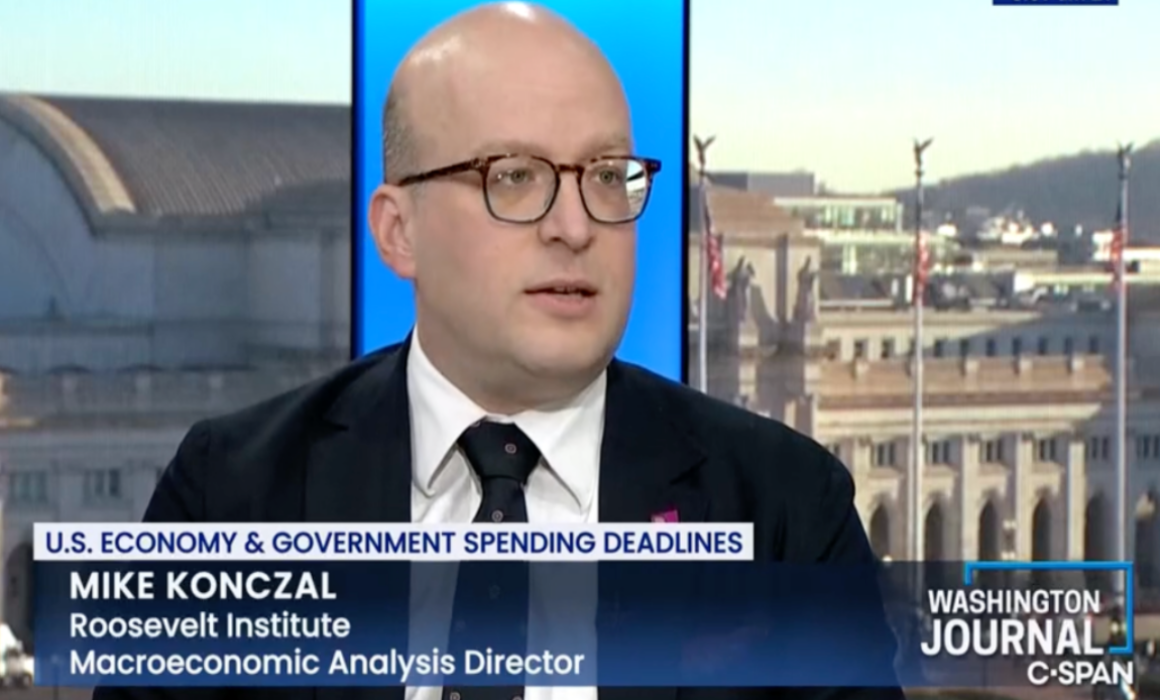Mike Konczal to Join the National Economic Council
March 25, 2024
After 14 years at Roosevelt, Konczal is headed to the administration to work on economic policy.
The Roosevelt Rundown features our top stories of the week.
Mike Konczal on C-SPAN’s Washington Journal in February 2024
Roosevelt’s Mike Konczal to Serve in National Economic Council
Mike Konczal, the former director of Roosevelt’s Macroeconomic Analysis program, is joining the National Economic Council as special assistant to the president for economic policy, the White House announced today. Konczal spent over a decade with the Roosevelt Institute and spearheaded key work that helped usher in a sea change in US economic policy.
“Mike started working at the Roosevelt Institute in the wake of the Great Recession,” said Roosevelt President and CEO Felicia Wong. “His early work fighting austerity has informed the policies and politics that led to many of the progressive macroeconomic victories of the last four years. The unprecedented economic recovery after the COVID-19 pandemic was driven by policies with Mike’s fingerprints all over them.”
One of Roosevelt’s earliest hires, Konczal worked on key issues including full employment and inequality. During his tenure, he contributed to major publications including 2013’s Rewriting the Rules of the American Economy and 2023’s Sea Change: How a New Economics Went Mainstream.
“Over the years, the Roosevelt Institute has played a key role in helping us understand how market economies actually work, the role of power, and how rewriting the rules of the economy can help create a better economy—one that improves the lives of everyone,” said Joseph Stiglitz, chief economist for the Roosevelt Institute. “Mike Konczal has been at the center of these efforts.”
“As he moves on to serve as special assistant to the president for economic policy in the National Economic Council,” Wong said, “he will be an exemplar of the Rooseveltian understanding that personnel is policy.”
Green Steel Is within Reach
The US has the ability to enable a green transition in the steel industry, but it’s still lagging behind European competitors. In a new Roosevelt Institute working paper, four experts look at the steel industry in Dearborn, Michigan, and examine the opportunities and challenges facing a just transition.
A lack of renewable energy infrastructure to produce green hydrogen, local fears about pollution and economic insecurity, and corporate resistance to decarbonization efforts: These are the challenges facing greener steel production, argue authors Isabel Estevez, Hebah Kassem, Yong Kwon, and Iliana Paul. Addressing them will require implementing activist industrial policy, ensuring worker and environmental protections, and using aggressive government action to pressure corporations.
“None of this is unrealistic,” the authors write. “[A]n equitable green steel transition is within reach for communities like Dearborn, in which local leadership has already built the foundation for transformative change.”
Read more in the working paper: “The Political Economy of Steel Decarbonization: Prospects and Challenges of a Green Steel Transition in Dearborn, Michigan”
What We’re Talking About
NEXT WEEK: The US is amidst an industrial & economic renaissance. But what comes next for the industrial policy agenda?
🌎Join us on March 27 as we explore the future of US industrial policy & its impact on achieving zero emissions by 2050. Register ⬇️ https://t.co/2ormsAsU16 pic.twitter.com/tRgOQWOoeg
— Roosevelt Institute (@rooseveltinst) March 21, 2024
What We’re Reading
The Fruits of the American Rescue Plan – Democracy Journal
US Sues Apple for Illegal Monopoly over Smartphones – The Verge
There’s a Big Wealth Gap between Union and Nonunion Workers – Axios
The Lie Banks Use to Protect Their Late-Fee Profits – The Lever


